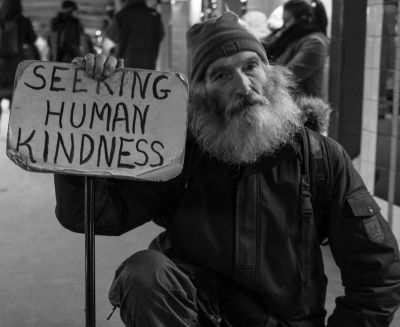How 1 Corinthians 13 can heal our broken society

It’s no secret that our country is in chaos right now. Every day we see individuals and news outlets screaming about violence and injustice, and perhaps rightfully so. I’m not writing to debate what the injustices are or which side of the political aisle is correct in their view of our current situation, but rather to inspire community and attempt to forge a new path in our society, one where everyone is accepted and we can all walk together.
To do this, we must learn to love one another. We must learn to put aside our hatred and distrust for others in our community and love everyone. This does not mean we have to agree with or approve of every person’s actions or beliefs. Bad ideas should be called out. But we can look beyond the idea to see the person and their character. In the political realm, for example, opposing ideas and civil discourse are foundational to a functioning society. However, when one fails to separate a person who holds an opposing opinion from their ideas and beliefs, the thoughts and recollections of that person become tainted and skewed in such a way that one begins to turn against and disown their neighbor, for the mere crime of holding a different belief.
However, if one chooses to reject solely the ideas and see other people for their character and unique personality, we are able to build meaningful relationships with each other, constructing bridges and laying the foundation for a united society. This is not to say that we can’t try to convince and sway each other to believe different viewpoints through means such as civil discourse, but rather to recognize that a person’s beliefs should be respected and treated separately from their character and personality.
Love isn’t just about accepting others, it’s about caring for one another and relaying a message that every person matters and holds a stake in our society. It’s the time someone spends volunteering at the local nursing home, talking to residents and serving the elderly community, the story a parent reads to their child’s class, bringing smiles to children’s faces as they listen intently, or the heartfelt card sent to someone struggling with grief.
Or at least, that’s what I imagine love looks like.
With that in mind, I find it interesting the way 1 Corinthians 13:4-7 defines love:
Love is patient, love is kind. It does not envy, it does not boast, it is not proud. It does not dishonor others, it is not self-seeking, it is not easily angered, it keeps no record of wrongs. Love does not delight in evil but rejoices with the truth. It always protects, always trusts, always hopes, always perseveres.
As a Christian, I feel called to be kind and express God’s love to everyone I encounter, no matter what they look like or the principles they believe. But when I think of love, I typically picture a heart of some sort, hugs and kisses, and people putting others before themselves. So the first question that pops into my head when I read this excerpt is “Why is patience the first quality the Bible attributes to love and not kindness?”
Why patience first?
Could it be that these verses are referring to a love much greater and much deeper than we could ever express through acts of kindness alone? When someone volunteers their time at a local nursing home, reads to their child’s class, or sends an uplifting card to someone in need of inspiration, they themselves are left with a warm feeling of love. Being kind pays dividends as our caring actions and words often translate into warm sensations and good feelings for us. In fact, there’s nothing wrong with these feelings. We should feel good when we help others! But being kind is only one part of the vast, indescribable love 1 Corinthians 13:4 outlines.
In Greek, the word used for patient in 1 Corinthians 13:4 is makrothymei, which (according to Google Translate) could also be interpreted as “long-suffering,” or as defined by Merriam-Webster, “patiently enduring lasting offense or hardship.”
The first thing that 1 Corinthians 13 attributes to love is patiently enduring pain administered for a long period of time. Let that sink in for a minute. 1 Corinthians says that patiently waiting while suffering is administered for a long period of time is what love looks like first and foremost.
The question remains: Why is patience first?
Because it shows that above all else, love is selfless.
When we show kindness to one another, we receive an internal feeling or positive response in return. When we are long-suffering, we get nothing in return. Patience or long-suffering is the first attribute to love because it is the epitome of selflessness. Saying that I will endure pain for an extended amount of time so that you can have your will and fulfill all of your desires before I receive any of mine; that’s true selflessness. That’s putting others before ourselves.
Now, I don’t believe 1 Corinthians 13:4-7 is saying to us, “we must seek out opportunities to suffer at the expense of others,” but rather asking us to be patient with others when we encounter suffering. These verses do not say that we can’t fight for what we believe in or stand up for what we think is right, but rather when we walk through trying times, feeling much pain and anger, it isn’t right to lash out or take out our feelings on others. Sometimes, trying to find a way around our suffering and hardships will only cause more pain for everyone, and not just the people involved.
But, while patience may be the first and most important attribute to the unconditional love 1 Corinthians 13:4-7 describes, it is only one of fifteen characteristics that those four verses outline. The rest of the verses read, “Love is kind. It does not envy, it does not boast, it is not proud. It does not dishonor others, it is not self-seeking, it is not easily angered, it keeps no record of wrongs. Love does not delight in evil but rejoices with the truth. It always protects, always trusts, always hopes, always perseveres.”
Our country is being torn apart right now. Bitterness and distrust are more prevalent than at any time in recent history. Hence, it is our duty as a society to speak out about the issues and principles close to our hearts. We must do so with love. We should point out bad ideas and offer better solutions. We must do so with love. We must stand up for what we believe is right. We must do so with love.
Anything destroyed by the animosity in our society can be healed with love. All acts of love, no matter the size, can help mend our hurting society. Let’s make the choice to show love in everything we do, adhering to all fifteen characteristics 1 Corinthians attributes to love, and lay the groundwork for a brighter future.
Joshua DuPuis is an incoming freshman at the University of South Carolina and lives with his family in Glen Allen, Virginia.



























